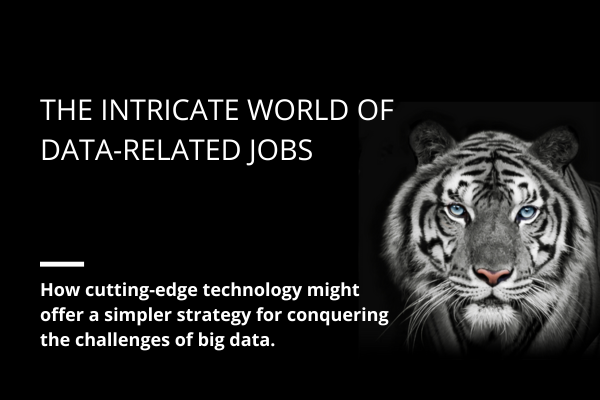Intro
The world of business is the world of data. From architects of data pipelines to the magicians of machine learning, every role is a piece in the vast mosaic of a modern business landscape. This specialization reflects a dance between managing the permanent flood of data and the strategic objective to harness it for growth. Yet, this complexity brings a critical question: Are armies of specialized roles the best way to master the data deluge? Or is there a more streamlined path hidden among the technological advancements? This whitepaper explores the intricate world of data jobs and unveils how cutting-edge technology might offer a simpler, more unified strategy for conquering the challenges of big data.
The Diversity of Data Jobs
As per a report by Deloitte, the digital universe is doubling in volume every two years and by next year it will reach 175 zetabytes. In this vast expanse of data, each byte offers potential insights that businesses are eager to exploit for competitive advantage. This urgency has given birth to a range of data professions, each tailored to handle specific slices of the data pie: Data Engineers construct the infrastructure for data movement and storage, Data Scientists apply mathematical models to extract predictive insights and Data Analysts translate data into business intelligence and recommendations. There is more. Data Protection Officers ensure compliance with data privacy laws and safeguard data integrity, Chief Data Officers oversee data governance and strategy across the organization, while Machine Learning Engineers develop algorithms and models to automate data processes and predictive analysis. Just to name a few.
But Why is Data So Complicated?
MIT Sloan Management Review highlights that data’s complexity stems from its sheer volume and the rapid rate of its generation. The data collected is diverse, arriving in unstructured, semi-structured, and structured forms, each requiring specific methodologies for processing and analysis.
Moreover, as businesses continuously aim to tailor their offerings to meet precise customer needs, they often deploy new software solutions to address each emerging use case — be it data visualization, quality management or complying with recent regulations. Retail companies, for instance, use customer segmentation tools for personalized marketing campaigns, leveraging consumer behavior data to boost sales. Healthcare providers implement patient data management systems to enhance treatment plans while ensuring data privacy compliance. Financial institutions employ real-time analytics for fraud detection, protecting against financial losses. Meanwhile, logistics companies use predictive analytics to optimize routes and manage inventory, reducing costs and improving service efficiency.
The Necessity of Specialization
The specialization of data roles can be viewed as a strategic response to the multifaceted challenges presented by big data. A McKinsey study on big data analytics as a new frontier for innovation, competition, and productivity underscores the importance of specialized expertise in mining actionable insights from vast, unstructured datasets. However, this specialization often leads companies to accumulate niche tools and solutions, each chosen to address specific operational use cases. This approach, while effective in the short term, can lead to a fragmented technology landscape, making integration and scalability a real challenge.
Is Specialization the Only Way?
Initially, the escalating complexity of data and its diverse applications required a solid lineup of specialized roles. However, as technology advances, the strategies for managing data are also evolving.
Modern Technology: A Unifying Force
Today’s advanced data management platforms embody a shift toward integration and automation. Such platforms are designed to be agnostic to specific use cases, providing flexible, scalable tools that can adapt to future needs without the continuous addition of new software solutions. By incorporating machine learning, these systems automate routine tasks such as data cleaning and normalization, which previously required manual intervention by data specialists.
Conclusion: Simplifying Data Management through Technology
The narrative of data management is transitioning from one of increasing complexity and specialization to one of streamlined integration and automation. Modern data technologies offer a way to consolidate diverse data roles, reduce dependency on multiple niche tools and embrace a more holistic approach. By selecting technology that is agnostic to specific use cases and flexible enough to accommodate future demands, organizations can not only enhance operational efficiency but also foster innovation. As businesses continue to navigate the vast oceans of data, the focus should shift from multiplying specialized roles and tools to deploying unified, adaptable technologies that simplify the entire data management process. This approach will not render data professionals obsolete but will empower them to focus on strategic, value-adding activities rather than getting distracted by never-ending technical details. Transforming big data from a byproduct of daily operations into a foundational pillar for strategic business decisions.









